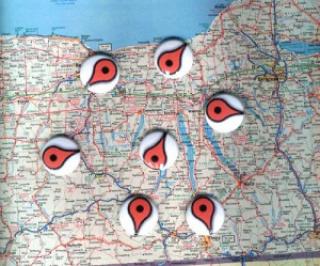Clusters: Doing Church in the 21st Century
By David A Miller, Tera Landers

As we advance deeper in to it, what will it mean to “do church in the 21st Century.” After years of being in silos of our own making, actually in opposition to the suggestions in the Cambridge Platform, we have such great potential to impact each other and our communities when we work together and see ourselves as one. This means blurring the lines of our traditional congregational and geographical borders to share resources, work together and increase our presence and impact to each other and the communities we serve.
Below you will find some general ideas for discussion, please insert your geographical area designation. Understanding there are some more rural congregations than others, it is just a starting point for possibilities.
Level One Cooperation
Have Yearly Board Kickoffs That Include:
- Shared Orientation and Training — What do Boards do and how do they do it, including sharing congregational information and what can be learned from each other and leadership training that includes conflict and change management
- Serving with Grace – Learning how to make leadership a spiritual practice
- Social time – Time for congregational leaders to form informal links
Share Cluster Calendaring/Meetings/Gatherings
- Sharing Calendars — in order to inform and support each other in our efforts — Too often we double book things, not entirely unavoidable, but certainly more foreseeable.
- Cluster Social Events — Designed to bring UU congregations together to cross borders and create joy, opportunities for connection
- Committee Leaders Meeting by Function – To brainstorm, share ideas and best practices. — Membership, Social Justice, Fund Raising, others
- Regular meetings of professional staff by category such as Administrators, DRE’s, Music Directors and the like – To brainstorm, share ideas and best practices
- Cluster Workshops, Activities and Events — Music events such as combined Choir Concerts (such as Sources Cantata), Seminary for A Day, co-sponsored speakers, Worship Retreats
Level Two Cooperation
- Shared Purchasing — cleaning supplies to insurance, could we find better deals?
- Shared Website Hosting — Maybe use one vendor and one shared webmaster.
- Shared Custodial Services
- Faith Formation in the 21st Century – Creating shared content for Facebook, Pinterest, Twitter, Weebly, and other electronic and New Media
Level Three Cooperation
- Shared Cluster Staff — These positions could be housed in one of our larger congregations (or maybe not) and the ratio of pay and the hours of each position would vary, but the intent would be for them to assist with cluster-wide efforts and to support individual congregational efforts as well.
- Social Justice Coordinators
- Young Adult and Campus Ministry
- Marketing/Outreach/PR
- BOOKKEEPERS
Level Four Cooperation
- Ministerial Specialization — A certain percentage of minister’s time would be spent in other congregations. In other words, in addition to or instead of shared cluster staff, there would be a minister that would help coordinate all the cluster social justice efforts or pastoral care for example.
Level Five Cooperation
Legal and official cooperation - Budgets of the congregations would be shared to support a broader perspective of what congregation means. Examples could include:
- Ministers who serve more than one congregation
- Preaching in more than one place each month
- Providing support and expertise in many ways to area congregations
- Looking at staffing differently/centralizing efforts in one place or another.
That could possibly lead to The Unitarian Universalists of [fill in the blank] County – North, South East and West Campus with one ministry staff led by a senior minister or ministerial leadership team and one board.